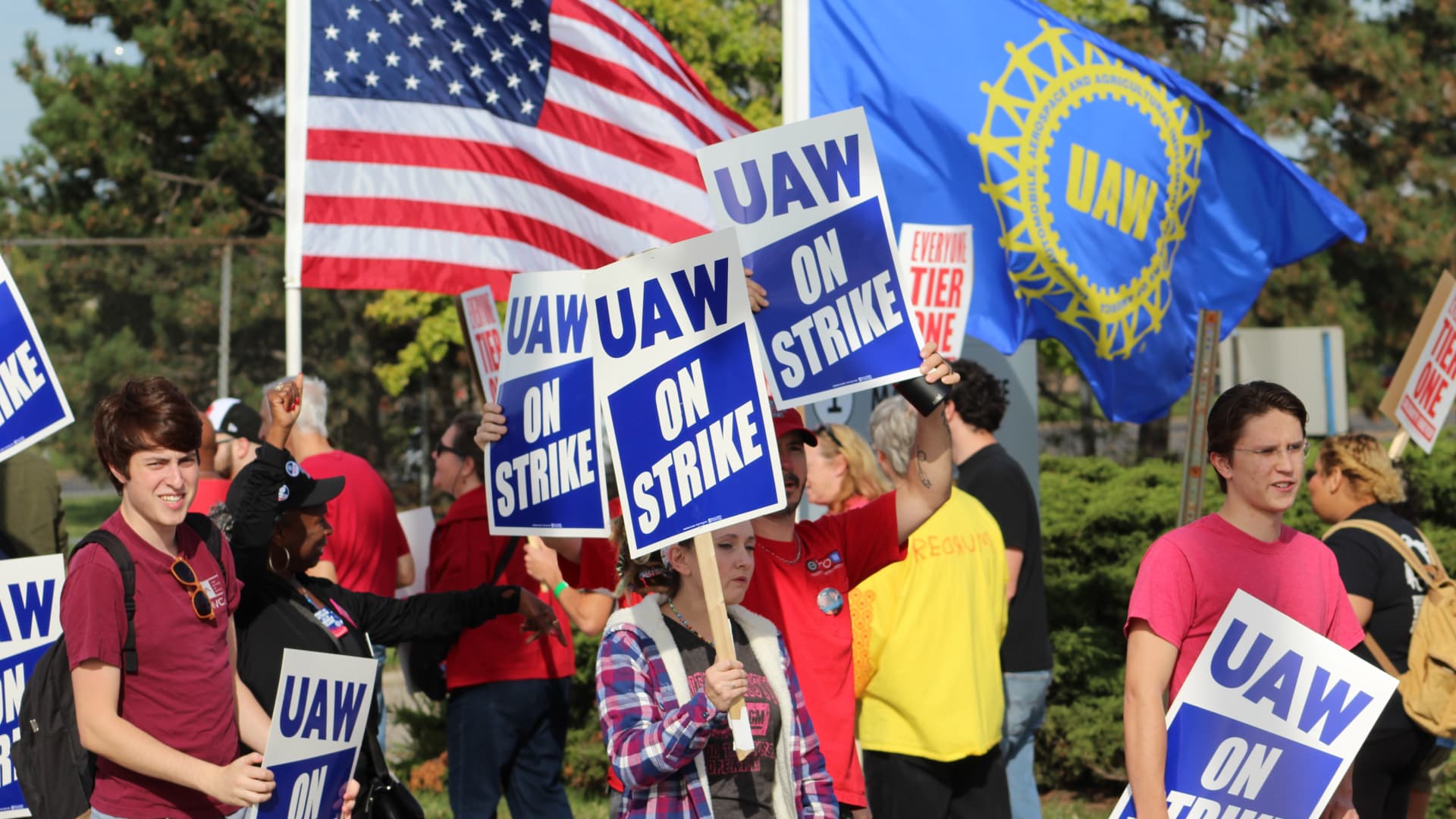The United Auto Workers (UAW) may employ a strategy similar to the 1998 strike if they decide to strike against the Detroit automakers next month, potentially causing serious damage to the industry by targeting key component plants or focusing on one automaker while striking at plants that produce its bestselling vehicles.
The United Auto Workers union is preparing for possible strikes at the nation’s three unionized automakers next month, as they seek to regain lost concessions and protect members during the transition to electric vehicles.
United Auto Workers members have overwhelmingly authorized a strike against General Motors, Ford Motor, and Stellantis during ongoing contract negotiations, with an average of 97% of members supporting the action, although the final votes are still being counted.
The United Auto Workers union and three Detroit automakers are facing a looming strike as contract negotiations stall, potentially impacting the U.S. economy and the companies' profits amid the shift to electric vehicles and demands for improved wages and benefits.
GM, Ford, and Tesla are expected to face rising labor costs, whether or not a strike occurs as the United Auto Workers' labor deal with the Detroit-Three automakers nears its expiration.
The United Auto Workers' potential strike could cost the U.S. economy $5 billion and disrupt production at certain UAW factories, particularly targeting Ford's popular F-150 pickup truck, potentially leading to higher prices and affecting the broader auto industry.
A potential United Auto Workers strike could have negative effects on car shoppers, particularly for certain models of cars, trucks, or SUVs, depending on the automaker and the specific vehicle desired.
Approximately 146,000 U.S. auto workers are poised to go on strike if General Motors, Ford, and Stellantis fail to meet their demands for substantial pay raises and restored benefits, potentially causing significant disruptions in auto production and impacting the U.S. economy.
If a strike occurs among the United Auto Workers at Detroit's Big 3 automakers, Tesla could benefit by potentially pushing back production and delays for its rivals in the electric vehicle market.
Car dealerships are preparing for potential strikes by the United Auto Workers against Ford, General Motors, and Stellantis, which could lead to inventory shortages and higher prices for both new and used cars.
The United Auto Workers union could potentially strike at Detroit's Big Three automakers if a deal isn't reached by the contract deadline, although progress is being made in the talks regarding wages.
The United Auto Workers union plans to implement targeted strikes at certain plants if tentative contracts are not reached with General Motors, Ford Motor, and Stellantis, potentially affecting local contract issues and involving work stoppages only at specific plants.
The United Auto Workers and Detroit's Big Three automakers are on the verge of a work stoppage that could have significant implications for the industry, the economy, and President Joe Biden's political standing, as negotiations over contracts are set to expire at midnight Thursday.
The United Auto Workers' strike against car companies in Michigan is seen as a real-time test of President Biden's economic agenda and policy positions, including higher wages for the middle class, support for unions, and the push for an electric vehicle future.
Investors shouldn't be worried about the impact of the strikes by United Auto Workers on Ford, GM, and Stellantis, as the lack of a significant reaction in stock prices suggests that the strikes have not been priced in and the market doesn't expect them to have a lasting impact on the economy.
The United Auto Workers strike presents a risk to the U.S. economy, but it also demonstrates that workers are advocating for their fair share in a strong macroeconomy, according to Council of Economic Advisers Chair Jared Bernstein.
The United Auto Workers' targeted strikes have a limited current impact on the U.S. economy, but the possibility of a full walkout could have significant economic costs for auto giants Ford, General Motors, and Stellantis.
The United Automobile Workers' strike against Michigan automakers presents both advantages and risks for Tesla, as the electric vehicle maker can leverage the work stoppages to strengthen its lead in battery technology and software but also faces the U.A.W.'s determination to secure a victory for its members through union organizing efforts.
The United Auto Workers union will expand strikes at General Motors, Ford Motor, and Stellantis plants if significant progress is not made in negotiations by Friday, potentially affecting thousands of workers.
Strikes by United Auto Workers at General Motors, Stellantis, and Ford plants could escalate on Friday if negotiations do not make significant progress, potentially affecting more automaker sites.
The United Auto Workers' phased strike strategy against the Detroit Three automakers is causing job losses and economic risks that will continue to escalate if more factories and facilities join the strike, potentially leading to a negative fourth quarter for the US economy.
The ongoing strikes in the U.S., including those in the entertainment industry and by the United Auto Workers, are causing significant economic losses and have raised concerns about a potential recession, with estimates suggesting damages of up to $10 billion and fears of reduced productivity, spending, and hiring.
The United Auto Workers strike against the Detroit-Three auto makers has made significant progress, giving the union a major breakthrough.
The United Auto Workers union has announced that Ford, General Motors, and Stellantis are likely to avoid an expansion of the ongoing strikes, as significant progress has been made in negotiations with GM regarding the future of auto jobs and the transition to electric vehicles.
The president of the United Auto Workers urges union members to continue their strike against Detroit carmakers, highlighting the importance of the labor movement and the fight against corporate greed.
